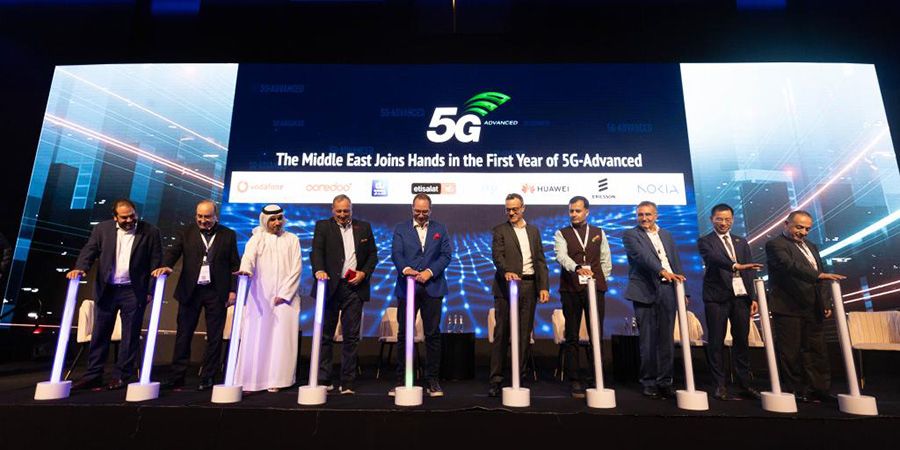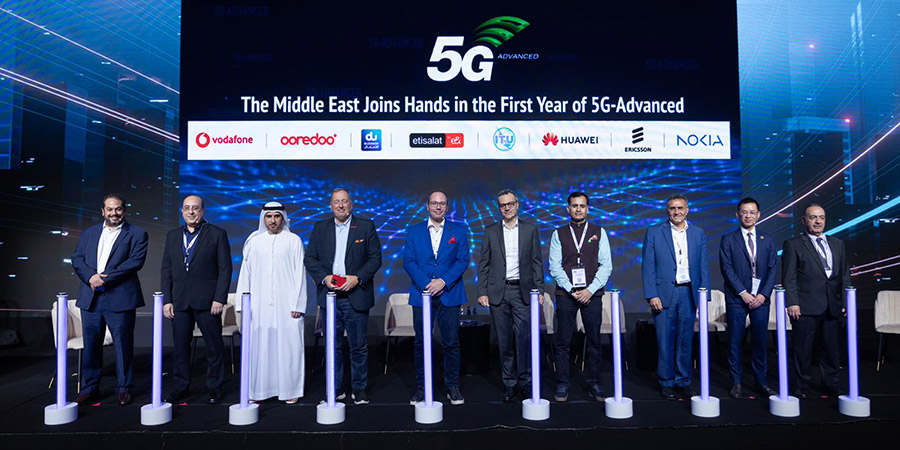A panel of industry experts, representing prominent telecom companies, technology providers, and regulatory bodies, shed light on the transformative potential of 5G Advanced in various sectors and the ground-breaking initiatives that have set the stage for the 5G-Advanced revolution. In unity, they joined hands to announce 2024 as the first year of the 5G-A era in the Middle East.
The esteemed panelists who joined the session are:
- Dr. Bilel Jamoussi, Deputy to the Director and Chief of Telecommunication Standardization Policy Department at ITU
- Dr. Mahmoud R. Sherif, Head of Innovation & Technico Business Development at du
- Khaled Al Suwaidi, Sr. Vice President/Core Network & Platforms at etisalat by e&
- Günther Ottendorfer, Chief Technology and Infrastructure Officer (CTIO) of Ooredoo Qatar
- Stelios Savvides, CTO of Vodafone Oman
- Tang Zhentian, President of Huawei Middle East and Central Asia Region Marketing & Solution Sales Department
- Noman Waheed, Chief Technology Officer (CTO) Middle East at Nokia
- Chafic Traboulsi, Vice President & Head of Networks at Ericsson Middle East
- Firas Mehdhebi, Managing Director Middle East, Private Equity at PMP Strategy (Moderator)

The Significance of 5G-A Deployment
Toni Eid, Founder of Telecom Review Group, opened the panel by emphasizing the significance of the Middle East's first year of 5G-A deployment. This breakthrough in connectivity holds immense potential for economic growth, innovation, and improved quality of life across the region. The panelists then delved into various aspects of 5G technology, offering unique perspectives on its applications and implications, and how 5G-A can unlock new opportunities and revolutionize industries.
Dr. Mahmoud R. Sherif, Head of Innovation & Technico Business Development at du, highlighted the advantages of 5G-A which include ultra-low latency, uplink speed enhancement, deterministic experience and sensing and precise location. He mentioned that the industry “promised too much in advertising 5G in the beginning,” but with 5G Advanced, the capabilities are being realized.
The Role of Collaborations and Partnerships
Tang Zhentian, President of Huawei Middle East and Central Asia Region Marketing & Solution Sales Department, shared insights into Huawei's contributions to the region's 5G development and its commitment to driving innovation. Working with 3GPP for 5G standardization, the 5.5G concept in the region is making strides, with the promise of greater opportunities and better value for all ecosystem players.
Noman Waheed, Chief Technology Officer (CTO) Middle East at Nokia, also underscored the vital role of collaborations and partnerships with telecom operators in the expansion of 5G services. Notably, Nokia's ongoing collaborations with Communication Service Providers (CSPs) exemplify its commitment to elevating user and machine experiences to the next level through 5G Advanced innovation. Waheed's emphasis on strategic partnerships reflects a collective effort to unlock the full potential of 5G and usher in a new era of enhanced connectivity for both users and machines.
Dr. Bilel Jamoussi, Deputy to the Director and Chief of Telecommunication Standardization Policy Department at ITU, provided a regulatory perspective on the adoption of 5G-A. He discussed the organizational and policy challenges, particularly in developing optical standards, which is being addressed to maximize the benefits of this technology.
The Importance of Innovation and Infrastructure
Khaled Al Suwaidi, Sr. Vice President/Core Network & Platforms at etisalat by e&, emphasized the importance of innovation and infrastructure. A main point he raised is the improvement to slicing technology, SLAs and network exposure function with 5G Advanced. In terms of business, “in 2021, we started building MEC and 5G core,” and in 2023, they have demonstrated RedCap during GITEX.
In a related context, Chafic Traboulsi, Vice President & Head of Networks at Ericsson Middle East, underscored the sustainability aspects facilitated by 5G Advanced. He explained that this technology will incorporate features designed to decrease power consumption, improve handover processes, broaden the scope of Extended Reality (XR) applications, enhance uplink capabilities, and more effectively manage network slicing. This holistic approach to 5G Advanced reflects a commitment to not only advancing connectivity but also prioritizing sustainability and efficiency in its diverse functionalities.
Günther Ottendorfer, Chief Technology and Information Officer (CTIO) of Ooredoo Qatar, delved into the transformative effects of 5G-Advanced (5G-A) on network capabilities. Highlighting advancements such as heightened capacity, accelerated speeds, and minimized latency, he showcased the pivotal role of Ooredoo in enabling the first 5G-enabled World Cup, providing fans with surreal experiences and underlining the telco's commitment to network reliability. Additionally, Ookla's Speedtest has affirmed the leadership of UAE, Qatar, and Kuwait in both mobile and broadband speeds, attesting to the tangible impact of 5G advancements in the region. Ottendorfer is proud that the Middle East region has come a long way globally, and 5G Advanced will help reestablish this position further.
Moreover, Stelios Savvides, CTO of Vodafone Oman, highlighted the importance of network infrastructure upgrades to support the demands of 5G-A and drive better customer experience. According to the CTO, they have 66% of the population covered in 5G, and their strategy is focused on “seeing data points that can be used for optimization.” One of the operator’s projects involves the voice over new radio (voNR) proof of concept (POC) call over a standalone 5G network.
As part of this panel, an initiation ceremony showing the solidarity among the telecom industry players also commenced on stage.






